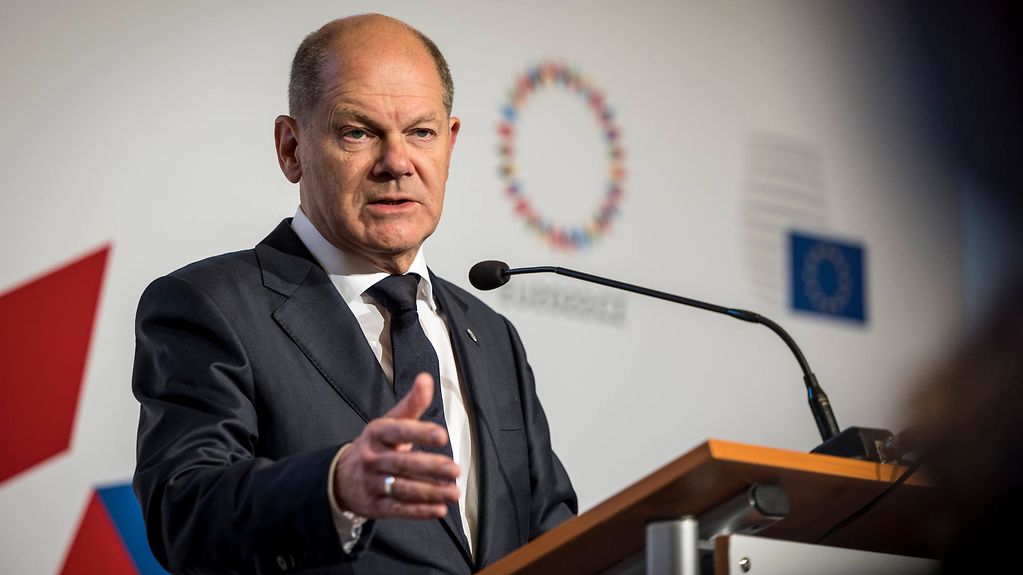The Federal Chancellor at the Informal European Council in Prague
European leaders discussed support for Ukraine at the informal European Council in Prague as well as what to do about the high energy prices. Before that, the Federal Chancellor attended the inaugural meeting of the European Political Community.
4 Min. Lesedauer

Federal Chancellor Scholz after the informal European Council meeting in Prague.
Foto: Federal Government/Köhler
Following the informal European Council in Prague, Chancellor Olaf Scholz stated that "Nobody among us accepts Russia's specious attempts to seize parts of Ukraine in violation of international law. As far as we are concerned, the results of these sham referendums are null and void." Every European state supports Ukraine in defending its sovereignty and territorial integrity. The good news, he continued, is that Ukraine's acute financial needs are practically covered for this year. One of the reasons for this is that the EU and its members have contributed billions of euros.
Federal Chancellor Scholz and Ursula von der Leyen, President of the European Commission, have invited experts to a conference in Berlin on the 25th of October, the purpose of which is to develop suitable instruments for providing lasting assistance to Ukraine, because, as Scholz said, rebuilding Ukraine will take generations.
Europe stands united during this crisis
Another important topic was energy prices, which are far too high. The European energy ministers agreed on a common emergency package last week in order to reduce the cost of energy in Europe, which will now be implemented at the national level.
The EU finance ministers have also agreed to implement the REPowerEU programme, which, according to Scholz, "is a package with which we are mobilising funds of well in excess of 200 billion euros". This will stimulate investments in the energy sector, which will ensure Europe's long-term independence from Russian energy imports.
600 billion from the Next Generation Programme
The Federal Chancellor highlighted the fact that Europe is financially strong enough to face the crisis. So far, only about one fifth of the generous funds from the major Next Generation EU programme, which was jointly adopted during the German EU Council Presidency, have been disbursed. "So," Scholz added, "we still have 600 billion euros of crisis management money available on our side.”
With the addition of national funds, this 600 billion is a "huge European financial commitment to counter Putin's attempts to bring Europe to its knees through energy blackmail", the Federal Chancellor said.
Once again, Scholz emphasised that by contributing 200 billion euros, Germany was staying within the bounds of what other European countries were also doing. This money, he said, was necessary for citizens, pensioners, families, and businesses. Germany's contribution is similar to that of other European countries.
In terms of potential European measures to counter the energy crisis, the energy ministers agreed that they should carefully examine the advantages and disadvantages of current proposals. Further deliberations would then take place on this basis at the next EU summit, which will be organised in Brussels in just under two weeks.
Coming together as equals in the EU
The inaugural meeting of the European Political Community was held the day before, which the Federal Chancellor described as a really good new format for discussions: "The entire European community has met here as equals to exchange views on the important issues of our time, which include security, energy supply, climate, and the economy, and to expand our collaboration." And states, whose voices are not often heard, were also present at the table. which is also to do with the turn of the times. Our intention, he said, is to continue the collaboration in this forum going forward. The next meeting will be held in Moldova in six months.
Security, stability, and prosperity in Europe
The purpose of the European Political Community (EPC) is to promote political dialogue and collaboration in the interest of Europe as a whole, with a view to enhancing security, stability, and prosperity on the European continent. The inaugural meeting was attended by the leaders of the EU Member States and European third countries.
Invitees included not only the 27 EU member states but also the EU accession candidates (Albania, Montenegro, Northern Macedonia, Moldova, Serbia, Turkey, Ukraine), and potential EU accession candidates (Bosnia and Herzegovina, Georgia, Kosovo) as well as Armenia, Azerbaijan, Iceland, Liechtenstein, Norway, Switzerland, and the United Kingdom. The event was also attended by the President of the European Council, Charles Michel, and the President of the European Commission, Ursula von der Leyen. As a forum for policy coordination, the EPC does not replace existing organisations, structures, or processes, nor does it aim to function as a new one and in no way does it serve as a substitute for the EU accession process.
The European Political Community - what is the importance of this forum?
What the Russian war of aggression shows is that a value-based, well-coordinated foreign policy is a prerequisite for a Europe of geopolitical stature. To achieve this status, the European Union will have to broaden its horizons, which it is now doing by holding regular meetings of the heads of state and government of all European countries in the newly established European Political Community Forum.